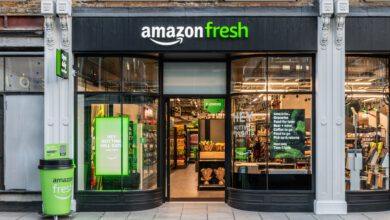How retailers can keep frontline staff from feeling undervalued and overstressed
Register to get 1 more free article
Reveal the article below by registering for our email newsletter.
Want unlimited access? View Plans
Already have an account? Sign in
In retail, the shop floor is where the customer experience comes to life. It’s where expectations are met — or missed. Yet for decades, frontline employees, the people most directly responsible for shaping that experience, have often been left without the tools, recognition, and support they need to thrive.
For Abby Gutkelch, Executive Advisory at Flip, the solution starts with rethinking how businesses communicate, connect, and empower their people. Drawing from nearly two decades in digital experience, including senior roles at Meta, Gutkelch believes retailers can unlock enormous value by putting employees at the heart of their strategy.
“I’m a firm believer in as of a statement of happy people equals happy customer equals happy business,” she explains. “And actually, if you treat and do right and create an environment where your people can, can thrive, they can connect, they can be together, then that will lead to excellent customer service, which in turn will will lead to to to to great business results.”
A Career at the Crossroads of Technology and Communication
Before joining Flip in September 2023, Gutkelch spent six years at Meta, working on the company’s Workplace platform — a tool designed to connect employees within large enterprises. “I was brought in as the communications industry expert to help them with their go to market strategy to actually reach their, um, uh, the, the sort of like end end user base,” she recalls. “While I was there, we grew our users from from 1 million to, to 15 million users. Um, several thousands of like customers ranged from Walmarts, you know, Starbucks, etc.. Um, through to, you know, lights of, uh, Nestlé and um, uh, Royal Bank of Scotland, etc..”
Her time at Meta also exposed her to emerging technologies like virtual and mixed reality, but it reinforced one constant: digital tools must enhance human connection, not replace it. That principle has carried directly into her work at Flip.
What Flip Does — and Why Retailers Should Care
Flip is an employee experience platform designed to connect hard-to-reach workforces, particularly frontline employees in sectors like retail, logistics, and manufacturing. “Flip is an employee experience, um, app or platform, um, which effectively is designed for enterprises with hard to reach, um, workforces and particularly, um, uh, Tesla’s workforce,” says Gutkelch. “We’re really on a mission to make people feel more connected to their, their work by connecting them not only with, with people and communications and information, but actually the the systems and the processes to help them get the most out of their work and empower them at work.”
The platform serves as a single, unified hub where employees can access schedules, training, recognition programmes, and live company updates. For retailers managing dispersed teams, Flip also simplifies access to dozens of systems under one login.
“An organisation probably has, you know, upwards of 20 or 30 different systems… And what we effectively do is integrate everything into the app so that… for the, um, the retail store associated, the, the employee, um, they they’re just getting it through Flip,” Gutkelch explains. “They don’t see the fact that you might be using Workday or SAP. And really it doesn’t matter to them who you’re using. They just want to be able to get in and do whatever they need to do.”
Frontline Disconnect: Why Retail Is Struggling
Despite the growing focus on employee experience, many retailers continue to overlook the specific needs of frontline staff. Flip’s research highlights worrying statistics: 23% of retail workers feel less valued than their office-based colleagues, the lowest sentiment across all frontline industries.
Gutkelch points to outdated communication as a key driver of this gap. “Frontline workers… prefer digital communications and that’s across all of the, the different age brackets,” she notes. “Um, yet too many retailers are still relying on analog methods of communication, be that through the staff notice boards or pre shift meetings. And they’re not actually then giving them, um, access into um, a sort of a one, um, uh, one app or one platform whereby everyone… can come in and actually consume the information and or access, um, uh, training or onboarding at the pace that they need.”
For employees expected to deliver seamless customer experiences, being kept out of the loop creates frustration, disengagement, and ultimately, turnover.
Recognition as a Retention Strategy
Flip’s research underscores a strong link between recognition, satisfaction, and performance. “Recognition has the biggest impact on job satisfaction,” Gutkelch explains. “When frontline workers feel recognised and appreciated, they’re over three times more likely to go the extra mile and nine times more likely to be satisfied with their, with their jobs.”
But despite the data, Gutkelch believes many retailers still fail to recognise the importance of visible, meaningful appreciation. From celebrating work anniversaries to publicly acknowledging achievements, small gestures can make a significant difference. “It’s one thing to say, well done, you know, manager to, to an employee, but actually showing appreciation for employees who have, um, gone the extra mile and actually sort of like publicly recognising them… just enables people to feel seen to be, um, to see, you know, to be seen, to be heard, to be recognised.”
A Wellbeing Crisis on the Shop Floor
Retail is also facing an urgent wellbeing challenge. Flip’s research reveals that 20% of retail employees report feeling burned out every day or multiple times a week, and only 44% describe their wellbeing as good or excellent — the lowest scores across frontline sectors.
Gutkelch says the solution starts with better communication. “Well-being and, uh, company communication actually goes hand in hand. You wouldn’t necessarily think that, but people’s ability to access and receive clear and transparent information… when they’ve seen that their company communication… is effective, they’re almost 13 times more likely to report good or excellent well-being, um, at work and 10 or 9 times less likely to report daily stress or burnout.”
For retailers, empowering employees with information isn’t simply a morale booster — it’s a driver of productivity and retention.
Case Study: McDonald’s Germany
One of Flip’s most compelling success stories comes from McDonald’s Germany, where inefficient shift scheduling was hurting both productivity and employee satisfaction. “There’s a crazy story of, um, people having to drive 45 minutes into the, the sort of the restaurant that they were part of. To just look at the notice board with the shift on, um, every single Sunday,” says Gutkelch.
Flip helped McDonald’s digitise scheduling and enable shift swapping within the platform. “That has gone a huge, um, way of actually sort of ensuring that, uh, that they don’t have any downtime, that their shifts are fully, um, uh, fully manned and also that, you know, they’re people are happier, um, because they’re not having to drive 45 minutes on a Sunday to come in and look at their, their shifts.”
The project demonstrates the tangible impact of giving employees tools designed for their realities rather than forcing them into outdated processes.
AI and the Future of Workforce Management
Looking ahead, Gutkelch sees artificial intelligence reshaping how retailers manage, train, and support their teams. “I know everyone’s talking about AI at the moment, but… thinking through like an intelligent task allocation. So, um, you know, assessing employee strengths, current workloads, um, and then sort of like real time store demands… Then you have the sort of predictive workforce management… actually helping managers, um, schedule shifts more effectively, thinking through all those different peaks and taking some of the pressure off.”
AI-powered chatbots are also poised to play a significant role in improving frontline efficiency. By enabling employees to instantly access answers and resources, Gutkelch believes technology can remove significant stress from retail environments and free up managers to focus on leadership rather than admin.
People at the Heart of Retail’s Future
Ultimately, while technology provides the tools, Gutkelch argues that meaningful change depends on retailers committing to a culture of inclusion and empowerment. “Without your people, you don’t have very much,” she says. “I don’t want to just put tech around it for sure. But it is, you know, truly embracing the, the, the people are at the heart of your business. Um, and, and how do you actually ensure that they feel valued and recognised.”
For retailers seeking to improve customer experiences, the lesson is simple: start with your employees. Engaged, recognised, and connected staff are not just happier — they drive better business outcomes.







